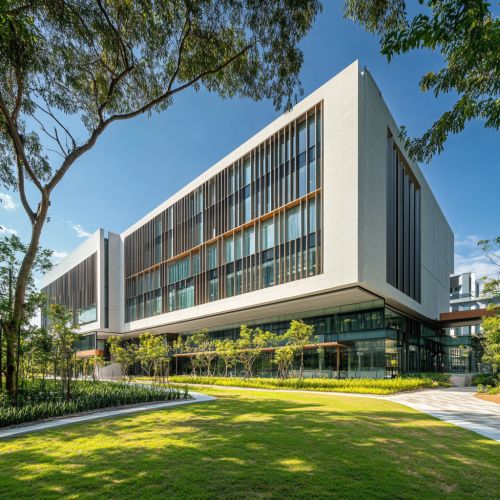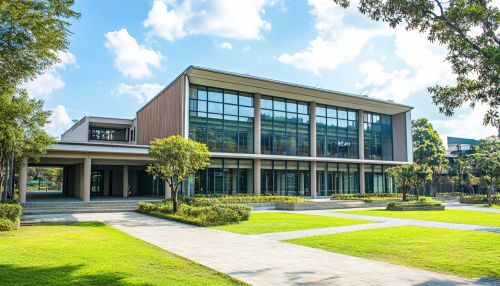University of the Faroe Islands
History
The University of the Faroe Islands (Faroese: Fróðskaparsetur Føroya) was established in 1965, initially as a research institution focused on Faroese language and culture. Over the years, it has expanded its academic offerings and research capabilities, becoming a comprehensive university. The institution was officially recognized as a university in 2008, marking a significant milestone in its development.
Academic Structure
Faculties and Departments
The University of the Faroe Islands is organized into several faculties, each comprising various departments that offer specialized programs and conduct research in their respective fields. The main faculties include:
- Faculty of Humanities: This faculty focuses on the study of Faroese language, literature, history, and culture. It also offers programs in other languages and social sciences.
- Faculty of Science and Technology: This faculty covers a wide range of disciplines, including biology, environmental science, engineering, and information technology.
- Faculty of Education: This faculty provides training for future teachers and educational professionals, with programs in pedagogy, psychology, and educational leadership.
- Faculty of Health Sciences: This faculty offers programs in nursing, public health, and other health-related fields.
Research Centers
The university hosts several research centers that focus on specific areas of study. These centers facilitate interdisciplinary research and collaboration with other institutions. Notable research centers include:
- The Faroese Language Council: Dedicated to the study and preservation of the Faroese language.
- The Centre for Maritime Studies: Focuses on maritime history, marine biology, and oceanography.
- The Centre for Social Research: Conducts research on social issues, including demographics, economics, and public policy.
Academic Programs
The University of the Faroe Islands offers a variety of undergraduate and postgraduate programs. These programs are designed to meet the needs of both local and international students, providing a strong foundation in theoretical knowledge and practical skills.
Undergraduate Programs
Undergraduate programs at the university typically lead to a Bachelor's degree. Some of the popular undergraduate programs include:
- Bachelor of Arts in Faroese Language and Literature
- Bachelor of Science in Marine Biology
- Bachelor of Education
- Bachelor of Nursing
Postgraduate Programs
Postgraduate programs at the university include Master's and Doctoral degrees. These programs are research-intensive and often involve close collaboration with faculty members. Some of the notable postgraduate programs are:
- Master of Arts in Faroese Studies
- Master of Science in Environmental Science
- Master of Education
- Doctor of Philosophy (PhD) in various disciplines
Research and Innovation
The University of the Faroe Islands is committed to advancing knowledge through research and innovation. The university's research activities are supported by both national and international funding agencies, and its researchers frequently collaborate with institutions around the world.
Key Research Areas
Some of the key research areas at the university include:
- Marine Biology and Oceanography: Research in this area focuses on the unique marine ecosystems of the Faroe Islands and the North Atlantic.
- Faroese Language and Culture: Scholars study the Faroese language, literature, and cultural heritage, contributing to the preservation and promotion of Faroese identity.
- Renewable Energy: Researchers explore sustainable energy solutions, including wind, hydro, and tidal energy, to address the energy needs of the Faroe Islands.
- Public Health: Research in this area aims to improve health outcomes for the Faroese population through studies on epidemiology, healthcare delivery, and health promotion.
Campus and Facilities
The University of the Faroe Islands is located in Tórshavn, the capital city of the Faroe Islands. The campus features modern facilities designed to support both academic and extracurricular activities.
Library
The university library provides access to a vast collection of books, journals, and digital resources. It serves as a vital resource for students and faculty, supporting their research and study needs.
Laboratories and Research Facilities
The university is equipped with state-of-the-art laboratories and research facilities, particularly in the fields of marine biology, environmental science, and engineering. These facilities enable cutting-edge research and hands-on learning experiences for students.
Student Services
The university offers a range of student services, including academic advising, career counseling, and mental health support. These services are designed to help students succeed academically and personally during their time at the university.


International Collaboration
The University of the Faroe Islands actively engages in international collaboration, partnering with universities and research institutions worldwide. These partnerships facilitate student and faculty exchanges, joint research projects, and the sharing of knowledge and resources.
Erasmus+ Program
The university participates in the Erasmus+ program, which allows students to study abroad at partner institutions in Europe. This program enhances the educational experience by exposing students to different cultures and academic environments.
Research Partnerships
The university has established research partnerships with institutions in Europe, North America, and Asia. These collaborations enable researchers to tackle global challenges and contribute to the advancement of knowledge in their respective fields.
Community Engagement
The University of the Faroe Islands is deeply committed to serving the local community. The university's outreach activities include public lectures, cultural events, and community-based research projects.
Public Lectures and Events
The university regularly hosts public lectures and events that are open to the community. These events feature prominent scholars and experts who discuss a wide range of topics, from science and technology to arts and humanities.
Cultural Preservation
As a key institution in the Faroe Islands, the university plays a crucial role in preserving and promoting Faroese culture. This includes research on Faroese traditions, language, and history, as well as the organization of cultural events and exhibitions.
Future Developments
The University of the Faroe Islands is continuously evolving to meet the changing needs of its students and the broader community. Future developments include the expansion of academic programs, the enhancement of research capabilities, and the strengthening of international partnerships.
Strategic Plan
The university's strategic plan outlines its vision for the future, focusing on key areas such as academic excellence, research innovation, and community engagement. The plan includes specific goals and initiatives aimed at achieving these objectives.
Infrastructure Projects
Several infrastructure projects are underway to improve the university's facilities. These projects include the construction of new buildings, the renovation of existing spaces, and the development of advanced research laboratories.
